The Saban Tsunami
One man's retirement has upended the college football landscape.
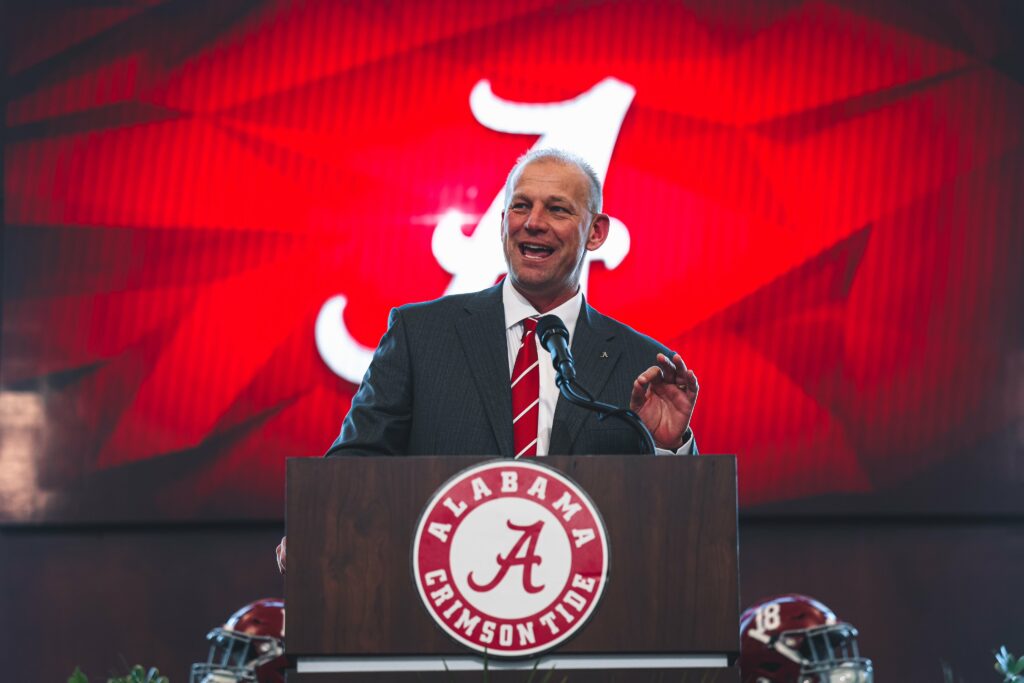
As one might imagine, the story I have been following most closely the past few days is the scramble at my graduate alma mater, the University of Alabama, in the aftermath of the surprise retirement of Nick Saban, its legendary head football coach. The news has been mostly good, all things considered, for Alabama fans, but it has set off a tsunami across the college football landscape.
Because Saban has spent the last seventeen years at the Capstone, I have only had mild interest in coaching hires since. And the rules have changed considerably since then, with the advent of pay-for-play and nearly unfettered player free agency.
Under current rules, which I support, players on teams experiencing a head coaching change—whether through firing, retirement, or the coach taking a new job elsewhere—are given an extra 30-day window in which to explore their options at other schools. The combination of immature players, hurt feelings, not knowing where they fit with the new staff’s plans, and other schools able to throw money at them for their services means star players jump into the “transfer portal” to test the market for their services.
Our athletic director, Greg Byrne, asked players to give him 72 hours to hire a new head coach. He did it in a mere 49, luring Kalen DeBoer, the former head coach of the Pac-12* champion Washington Huskies, fresh off a loss in the national title game, to Tuscaloosa. The hire has been almost universally praised by analysts whose opinions I value.
Nonetheless, quite a number of players who signed on to play for the GOAT jumped into the portal and a few others are reportedly thinking about it. While somewhat frustrating from a fan’s standpoint, I get it. They don’t have relationships with the new staff yet and probably feel betrayed by Saban’s retirement. Being coached by the best to ever do it was surely part of the appeal of coming to Alabama, and he almost certainly gave them the impression that he was going to be there their whole tenure.
But, aside from my fan-driven concern about player retention and who DeBoer would hire to fill out the staff, the thing that has fascinated me is how much impact Saban’s retirement has had on the whole world of college football.
Most immediately, of course, Alabama’s players and coaching staff were put into limbo. Who would coach the team? Which assistants would be retained? Already, one key defensive staffer has decamped for Georgia.
But, 49 hours after Saban delivered the news to his players, DeBoer did the same to his Husky players. Four days removed from playing for the national championship, they got told their coach was leaving them for greener pastures. Exactly the same sort of feelings and turmoil I’ve described in Tuscaloosa is going on in Seattle now. (With the added bonus of Pete Carroll being forced out at the Seahawks.)
It didn’t end there, of course.
It took roughly another 48 hours for Washington to replace DeBoer, hiring Jedd Fisch away from the University of Arizona. So, naturally, the anger and angst at Tuscaloosa and Seattle is taking place in Tuscon, mutandis mutatis.
San Jose head coach Brent Brennan has reportedly been offered the job. One imagines he’ll take it.
Oh, and after the aforementioned Alabama staffer, Tavares Robinson, turned down an offer to stay in Tuscaloosa as DeBoer’s defensive coordinator, DeBoer turned around and offered the job to South Alabama head coach Kane Wommack. He took it. So, of course, there’s now an opening in Mobile. Most of the candidates to replace Wommack are either already on staff or out of work (including Tommy Rees, who was Alabama’s offensive coordinator but not retained by DeBoer, who brought his guy with him from UDub), so we’re unlikely to see another big wave—unless they hire Marshall head coach Charles Huff or Rich Rodriguez, head coach at my undergrad alma mater, Jacksonville State.
So, to reiterate: Saban’s leaving created head coaching changes at at least four schools. Dozens of assistant coaches are either out of work or had to scramble to move to a new school in January, smack in the middle of a school year. Hundreds of student-athletes have new head coaches and/or are changing schools halfway through an academic year.
UPDATE (17 Jan, 0626): Roughly 24 hours later, more ripples. Brennan indeed took the Arizona job, so there’s now a search to fill that vacancy. Meanwhile, DeBoer lured another head coach, the University of Buffalo’s Maurice Linguist, to his staff to coach defensive backs. Obviously, that creates another vacancy to fill, if not a whole staff.
_______________
*May it rest in peace.


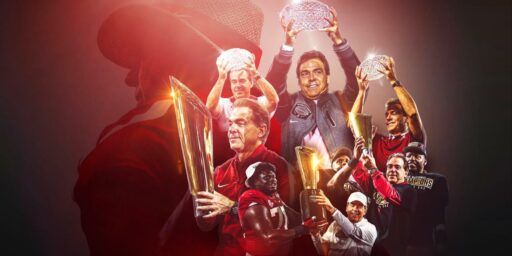
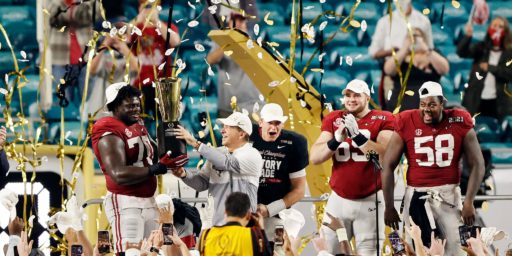
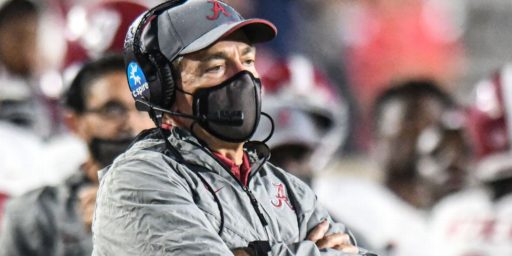
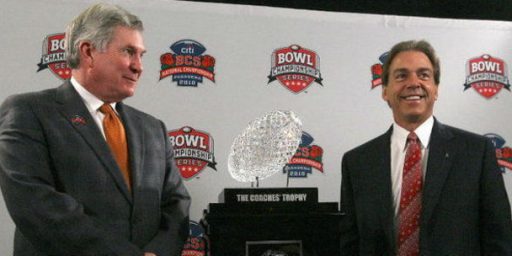
I’m probably in a very small minority here but the more college football/basketball etc. rapidly professionalizes, the less I’m interested. Same way I’ve lost interest in pro football. It really is all about the money. And I’m not willing to part with my money to support the excesses. I’m also voting against taxpayer money being used to build stadiums and infrastructure. It is just another wealth transfer upwards.
@Scott: It’s been a big-money business for decades, if not more than a century. The NCAA and the Ivy League formed because of pay-for-play scandals and other excesses. And the movement of coaches from lower-tier schools to higher-tier schools has been going on for longer than I can remember.
Some of the moves toward professionalism have been positive. I’ve mostly enjoyed the emergence of a playoff system, despite its obvious drawbacks. And, while unfettered free agency and pay-for-play are bad for the sport, it’s probably better than coaches lying to players, who then are stuck with a program, and under-the-table payments. What’s needed here, frankly, is more professionalization—probably to include simply recognizing that players are employees, not “amateur student-athletes,” and signing them to contracts and a larger collective bargaining structure.
What I lament the most is that, because football is where the money is, we’ve destroyed the regional conferences. While it’s been a mixed bag for football—I, for one, look forward to Texas and Oklahoma joining the SEC and creating more exciting matchups—it’s a disaster for lower sports. And, as Saban predicted, the downside of the playoff is that it makes winning the national championship the only goal. A team can go 14-1, losing the title game, and have a failed season.
@James Joyner: Then college football is no longer a college sport. It is a fiction. It has nothing to do with education. Spin the organizations off and let them be minor league teams for pro football.
@Scott: Currently, at least, the players are students at the universities for which they play and have to meet academic standards to enroll and remain eligible. Saban routinely graduated his players in three years.
But, at the highest levels of the sport, I’m not sure star football and basketball players were ever “student-athletes” in the sense of being students first and foremost. They’re recruited for their athletic talent and are hoping to turn their college careers into very lucrative ones at the professional level. Many of them do, in fact, get a college education out of the deal but it’s not their primary motivation and hasn’t been in my lifetime.
@Scott: @James Joyner:
Read “The Eighty Yard Run” by Irwin Shaw.
@James Joyner:
While I agree that is the hope of many, I don’t know whether playing past college is the hope of most. It certainly isn’t the outcome for most. Most get a college education for free or a significantly reduced cost and then end up in the job market with their less athletic peers. Those athletes need to keep student in their title because that is going to be the relevant ticket to their careers.
@Joe: It’s a much higher percentage at the elite level but, yes, even the Alabamas and Ohio States and Georgias of the world only send a portion of their players to the NFL—and most of those that go don’t hang on. If nothing else, they need their college degrees if they want to be high school or college coaches.
Like everyone else I follow college basketball and football, however I find the consumer experience to be very degraded. Whole conferences have either disappeared or morphed into behemoth conferences with identity crisis issues. Maybe we’re at the point where all Division 1 football programs should be subsumed into a 300 team SEC – divided into SEC Pacific, SEC Mountain, SEC Mid Atlantic, SEC Great Lakes, etc …
How absurd can it be? Very. Cal and Stanford will be in the ATLANTIC Coast Conference next year. And about half the PAC-Whatever will, be in the Big-TenOrWhateverItIs.
Add to that … players are free to constantly transfer between and among schools, and the competition to bribe athletes with cash and emoluments, and … well I’ve lost much interest, in fact I don’t pay much attention to the college game until these athletes reach the NFL or NBA.
@al Ameda:
Same. I was heretofore happy about the NIL and agnostic about the conference realignment, but I was wrong.
The loss of intra-conference rivalries is sad from fan perspective. Ditto the portal turning college athletes into pro-style free agents but with even more mobility. It does make college football more disjointed. I underestimated how much collegiate tradition factored into enjoyment of the game.
Given the astronomical amounts of revenue, big name athletes do deserve some sort of compensation above class credit. But the NIL system needs heavy regulation.
I hope the expanded playoff will make the game a bit more exciting. I don’t buy Saban’s argument that a bigger playoff attenuates the season, it’s the conference consolidation that’s really problematic. Winning a conference or Rose Bowl have remained worthy goals with bragging rights — we still include number of conference championships won when we speak of a coach’s CV.
@DK: It seems to me, but I haven’t really followed the break up/consolidation particularly closely, that none of the new conferences offer the possibility of playing everyone you will be competing against in your conference. I fully expect that the next playoff tsunami in a teapot will be from some coach/AD/sportswriter that “sure, but X never played Y this year.”
College football absolutely is no more “all about money” today than it was at any point in the past. Anyone who ever let themselves think that simply was unaware of the wild sums sloshing into the swimming pool coffers of the athletic department hedge funds with a school vaguely attached on alternate Thursdays. [Or is arguing in bad faith, in which case why are you still reading this]
Only difference today in CFB is that workers are finally getting paid for their labor.
The tell that the history of “college football” was simple exploitation — After NIL payments started, the practice time required did not change one iota. Sure, there’s always one or two guys on the entire team majoring in pre-med or engineering.. but the vast majority of kids are barely making progress towards a degree in exercise science or sports marketing.
It’s not “the kids” about the money… It’s always been the athletic directors and conference presidents both being about the money AND controlling/defining the consumer experience.
If anyone thinks the CFB consumer experience is degraded with the 2 competing near-monopolies of big10 and SEC.. maybe recognize that the same [contraction of power leading to monopolies and resultant degradation of customer experience] is happening in dozens of industries, and add your voice to organizations seeking to fight corporate power?